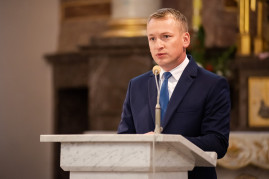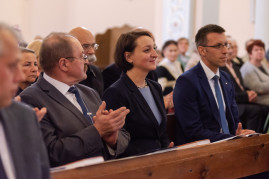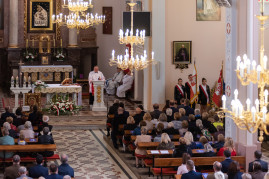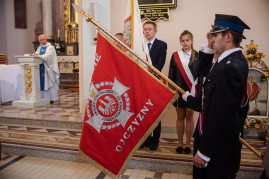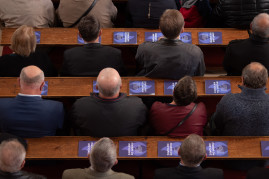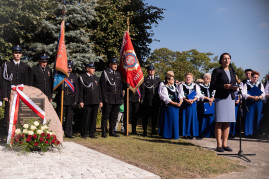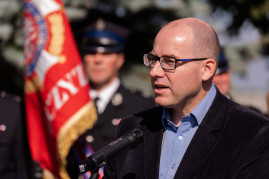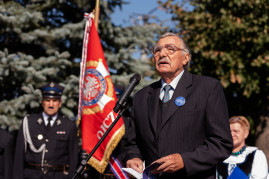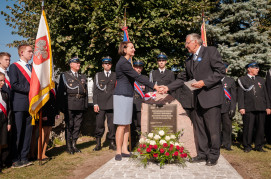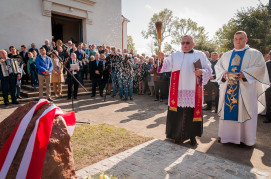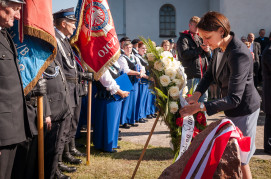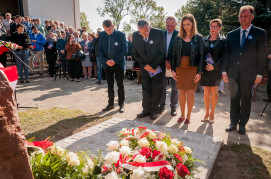Wacław Budziszewski commemorated for assisting Jews - Instytut Pileckiego
On Sunday, 22 September 2019, the Pilecki Institute paid tribute to Wacław Budziszewski, murdered for providing assistance to Jews during the war. A memorial plaque was unveiled in the town of Nur near Ostrów Mazowiecka.
“It was a wonderful, loving, Catholic and patriotic family. With close ties between the parents and children,” said Prof. Magdalena Gawin, Deputy Minister of Culture and National Heritage, during the unveiling ceremony. “First, there was the decision to take in a Jewish family. Then the astonishing decision of the son, 18-year-old Wacław, to come forward and take all the ‘blame’ upon himself. By doing so, he sealed his death sentence, but saved his siblings and parents. We can only imagine the burden that the family had to live with for many decades. Why were the names not collected? Why were there no commemorations? Why was these people’s sacrifice ignored? Why were the families left to fend for themselves? All of us gathered here have to undo this legacy of the communist period, the legacy of ignoring and forgetting. We are here today to affirm all the values that guided the actions of this family. They are your neighbors, they are Poles, Polish citizens. Local memory is important for the emergence of a national narrative. There is no national memory without local memory,” Prof. Gawin said.
The next speaker was Dr. Wojciech Kozłowski, Director of the Pilecki Institute, coordinator of the “Called by Name” project within whose framework the commemoration of Wacław Budziszewski took place. “Wacław Budziszewski and his whole family proved that one can act righteously to help those in need. [Their actions are] part of a history that we want to and can be proud of. There have been increasingly frequent attempts to convince us that we should continually be ashamed of our history. No, that’s not true. Here is the proof. Wacław Budziszewski’s stance is best described by a quote that you know well: ‘Greater love has no one than this, than to lay down one’s life for his friends’,” Kozłowski stated.
At the end, Konstanty Budziszewski, Wacław’s surviving brother, spoke. “Prime Minister Mateusz Morawiecki said that heroes who laid down their lives for the fatherland deserve eternal memory. My brother Wacław was one of them. My family hid a Jewish family on my parents’ farm in the village of Żebry-Laskowiec. When the Germans found out about this from some evil person, they took everyone outside. My father was asked how long the Jews had been staying on our farm. Wacek stepped forward and said that it was he who had brought the [Jewish] family in at night and let them into our farm buildings. Wacław was deported to Stutthof, where he only lived for 33 days. I have with me documents that confirm all this.” At the end, he confessed, “Ten years ago I decided that the world should find out what happened. Over those ten years, all of this became possible.”
The story of Wacław Budziszewski
Henryk and Stanisława Budziszewski’s farm was located on the outskirts of the village of Żebry-Laskowiec in Ostrów Mazowiecka county. When World War II broke out, the Budziszewskis had two teenage sons – Wacław and Stanisław. A third son, Konstanty, was born at the beginning of December 1942. Two months after his birth, a family of Jewish fugitives – a couple with two teenage sons and a daughter – asked the Budziszewskis for shelter. The Budziszewskis knew them because they had owned a store in nearby Nur. They decided to shelter them in their barn even though those assisting Jews were subject to the death penalty. After about two weeks, early in the morning, German gendarmerie trucks stopped in front of the farm, accompanied by Gestapo men on horseback. The Germans found the shelter. Both of the families were brought outside. An interpreter asked Henryk Budziszewski how long he had been hiding the Jews. At that moment, the Jewish boys broke free and tried to run for the woods. The brothers were quickly felled by German bullets. The interpreter repeated the question. When the farmer remained silent, eighteen-year-old Wacław Budziszewski decided to save his parents. He stepped forward, shouting that his father knows nothing because it was him who had brought the Jews to the barn the night before and he only intended to tell his parents about it in the morning. The Germans were satisfied. The Jewish family was loaded into a car, carried away and murdered in an unknown location. The Gestapo men took Wacław away to Nur, driving him, tied, in front of their horses. He was soon sent to Białystok, whence on 27 February he was deported to the concentration camp at Stutthof as prisoner no. 19988. His camp registration card stated “Quartering Jews” as his offense. Wacław Budziszewski only remained alive for 33 days at KL Stutthof. He died on 1 April 1943. His parents and brothers were sent to a place near Königsberg (today Kaliningrad), where they were forced into slave labor, only returning to Poland in May 1945.
See also
- Oppositional Engagement of Women in Authoritarian and Totalitarian Systems of the 20th Century: Poland in a Comparative European Perspective (1919–1989)
conference
Oppositional Engagement of Women in Authoritarian and Totalitarian Systems of the 20th Century: Poland in a Comparative European Perspective (1919–1989)
We invite scholars to participate in an international academic conference devoted to various forms of activity undertaken by women who engaged in opposition and dissent under authoritarian and totalitarian rule in the 20th century.
- CALL FOR PAPERS: Oppositional Engagement of Women in Authoritarian and Totalitarian Systems of the 20th Century: Poland in a Comparative European Perspective (1919–1989)
conference
CALL FOR PAPERS: Oppositional Engagement of Women in Authoritarian and Totalitarian Systems of the 20th Century: Poland in a Comparative European Perspective (1919–1989)
We invite scholars to participate in an international academic conference devoted to various forms of activity undertaken by women who engaged in opposition and dissent under authoritarian and totalitarian rule in the 20th century.
- Pilecki Institute International Teachers and Educators Program 5th edition. Post-war decade. | Call for participants
project
Pilecki Institute International Teachers and Educators Program 5th edition. Post-war decade. | Call for participants
Recruitment for the fifth edition of the Pilecki Institute International Teachers and Educators Program has begun. We invite teachers and educators from around the world to participate in the online conference. This year, we are focusing on the history of
